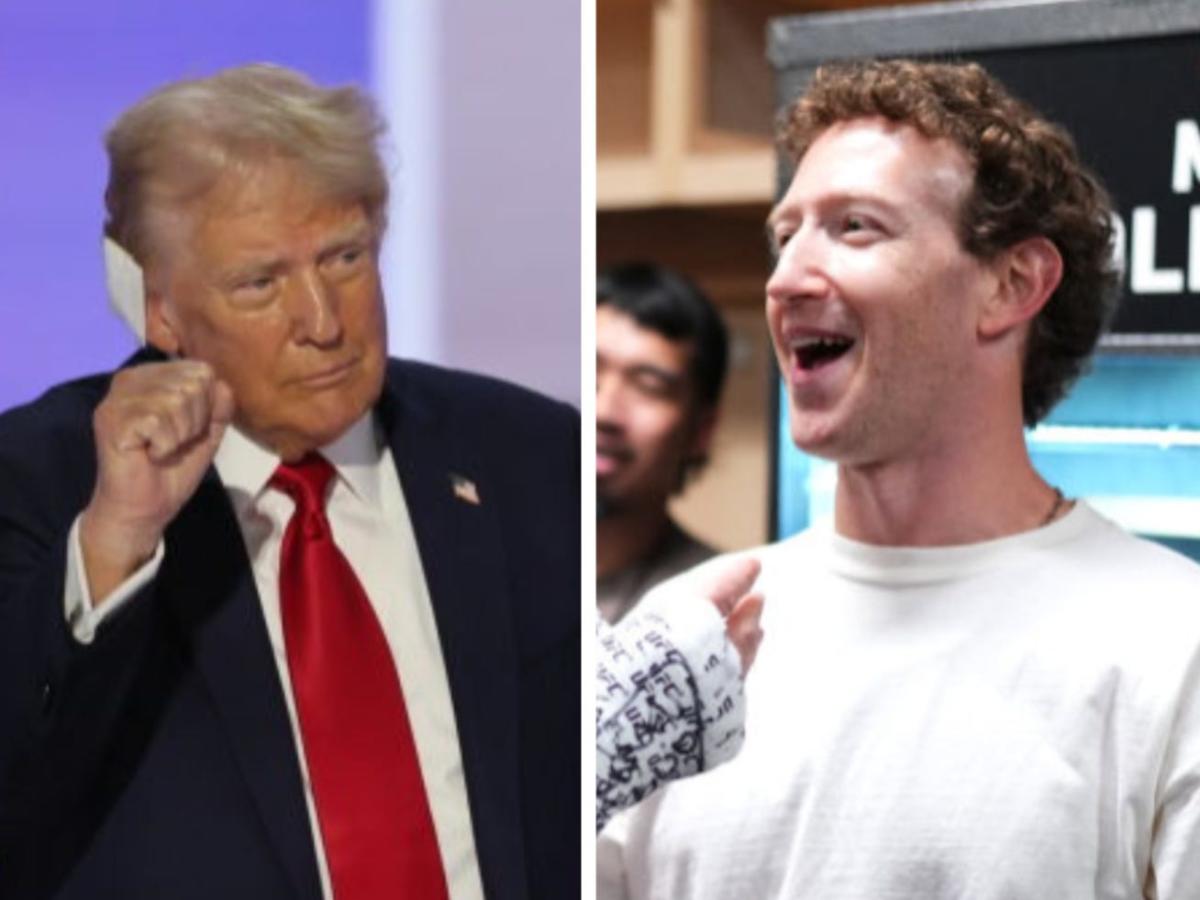Meta Under Trump: Zuckerberg's Challenges And Opportunities

Table of Contents
The Rise of Misinformation and the Fight for Content Moderation
The Trump administration brought a surge in misinformation and propaganda, posing a formidable challenge to Meta's content moderation efforts. This period forced a reckoning with the limitations of algorithms and the inherent difficulties in policing online content effectively.
The challenge of combating fake news and propaganda during the Trump presidency.
- Increased pressure from politicians: The Trump administration frequently criticized Meta and other social media platforms for perceived bias and insufficient efforts to combat fake news, creating a highly charged political environment.
- Public outcry over biased algorithms: Concerns over algorithmic bias amplified during this period, with accusations that Meta's algorithms were inadvertently promoting misinformation or suppressing conservative viewpoints.
- Difficulty in defining and removing misinformation effectively: Defining and removing misinformation proved incredibly complex, requiring constant adaptation to evolving tactics and the need for nuanced judgment calls.
- Legal challenges to content moderation policies: Meta faced legal challenges to its content moderation policies, highlighting the complex legal landscape surrounding free speech and online content.
Specific examples include the proliferation of false claims about the 2020 election and the use of social media to organize and promote the January 6th Capitol riot. Meta's response involved increased fact-checking partnerships and algorithmic adjustments, but the effectiveness of these measures remained a subject of ongoing debate. The ongoing relevance of Section 230, which shields online platforms from liability for user-generated content, was constantly questioned and became a central point of contention.
Opportunities for improved fact-checking and transparency initiatives.
- Enhanced partnerships with fact-checkers: Meta expanded its partnerships with independent fact-checking organizations, aiming for more robust verification of information shared on its platforms.
- Development of more sophisticated AI detection tools: Investments were made in artificial intelligence to improve the detection of misinformation and harmful content, though these tools remain imperfect.
- Increased transparency in content moderation processes: Meta made efforts to increase transparency regarding its content moderation policies and practices, though criticisms about lack of clarity persist.
- User education programs: Initiatives were launched to educate users about how to identify and avoid misinformation, aiming for a more informed and resilient online community.
These initiatives, while laudable, faced ongoing criticism regarding their efficacy and the inherent challenges in combating the rapid spread of disinformation in a highly polarized political environment.
Political Advertising and Campaign Interference Concerns
The Trump era brought intense scrutiny to the role of targeted political advertising on social media and its potential for manipulation. Concerns about foreign interference and the impact of micro-targeting on election outcomes were amplified.
Scrutiny over targeted political advertising and its potential for manipulation.
- Concerns about micro-targeting: The precision of micro-targeting raised concerns about the potential to manipulate voters through personalized messaging.
- Foreign interference in elections: The 2016 election exposed the vulnerability of social media platforms to foreign interference, prompting investigations and calls for greater regulation.
- Lack of transparency in political ad spending: Concerns persisted about the lack of transparency in political ad spending on Meta's platforms, hindering efforts to track and understand the influence of political advertising.
- Calls for increased regulation of political advertising on social media platforms: The Trump presidency fueled calls for greater regulation of political advertising on social media, aiming for increased transparency and accountability.
The Cambridge Analytica scandal, which involved the harvesting of user data from Facebook (now Meta) and its alleged use in influencing the 2016 Trump campaign, dramatically highlighted these concerns.
Opportunities for developing more responsible advertising practices.
- Implementation of stricter ad transparency policies: Meta implemented stricter policies regarding the disclosure of who is paying for political advertisements.
- Improved ad verification processes: Efforts were made to improve ad verification processes, aiming to detect and prevent malicious ad campaigns.
- Development of tools to detect and prevent malicious ad campaigns: Investment continued in technologies designed to identify and remove inauthentic or manipulative advertising.
- Increased collaboration with election officials: Meta increased collaboration with election officials to share information and improve coordination in addressing election-related misinformation and malicious advertising.
Policy changes following the 2016 and 2020 elections reflected Meta's attempts to improve the transparency and accountability of political advertising on its platforms.
Government Regulation and Antitrust Scrutiny
The Trump administration's focus on technology regulation and antitrust enforcement led to increased scrutiny of Meta. The company faced investigations into potential monopolistic practices and concerns regarding data privacy.
Increased government regulation and antitrust investigations under the Trump administration.
- Investigations into potential monopolies: Meta faced several antitrust investigations concerning its market dominance and potential anti-competitive practices.
- Concerns about data privacy: Concerns about the collection and use of user data fueled calls for stricter data privacy regulations.
- Pressure to break up Meta: Some called for the breakup of Meta, arguing that its size and influence posed a threat to competition and consumer interests.
- Legislative proposals to regulate social media platforms: Numerous legislative proposals aimed at regulating social media platforms were considered during this period.
These investigations involved various government bodies and resulted in ongoing legal battles and public debates about the appropriate level of government intervention in the tech industry.
Opportunities for strategic partnerships and proactive regulatory engagement.
- Proactive engagement with regulators: Meta engaged proactively with regulators to address concerns and influence policy discussions.
- Strategic acquisitions to expand business areas: Meta pursued strategic acquisitions to diversify its business and mitigate potential regulatory risks.
- Collaborations with other tech companies: Collaborations with other tech companies aimed to address common regulatory challenges and foster a more unified industry voice.
- Investment in lobbying efforts: Meta invested heavily in lobbying efforts to influence regulatory decisions and shape the legal and policy landscape.
These strategic moves reflected Meta's attempts to navigate the complex regulatory environment and mitigate the risk of stricter regulations.
Conclusion: Lessons Learned and the Future of Meta in a Politically Charged Environment
Meta Under Trump faced unprecedented challenges, ranging from combating the spread of misinformation to navigating intense political scrutiny and antitrust investigations. The company's evolution during this period highlights the ongoing tension between free speech, content moderation, and the need for responsible technology development. The experiences of Meta under Trump underscore the lasting impact of political climates on social media platforms, necessitating continuous adaptation and a proactive approach to addressing emerging challenges. Understanding Meta under Trump provides crucial insight into the ongoing challenges and opportunities facing social media platforms. Let's continue the conversation about creating a safer and more transparent digital landscape, ensuring that platforms like Meta remain accountable and responsive to the needs of their users and society as a whole.

Featured Posts
-
 Baby Lasagna Eurosong Povratak
May 19, 2025
Baby Lasagna Eurosong Povratak
May 19, 2025 -
 Michael Morales Two Ufc Performance Bonuses In A Row
May 19, 2025
Michael Morales Two Ufc Performance Bonuses In A Row
May 19, 2025 -
 Wembley Witness Haalands Goal Scoring Struggle In Fa Cup Final
May 19, 2025
Wembley Witness Haalands Goal Scoring Struggle In Fa Cup Final
May 19, 2025 -
 Brett Goldsteins First Stand Up Special Coming To Hbo In April
May 19, 2025
Brett Goldsteins First Stand Up Special Coming To Hbo In April
May 19, 2025 -
 Cannes 2025 Kristen Stewarts The Chronology Of Water Celebrated With Standing Ovation
May 19, 2025
Cannes 2025 Kristen Stewarts The Chronology Of Water Celebrated With Standing Ovation
May 19, 2025
